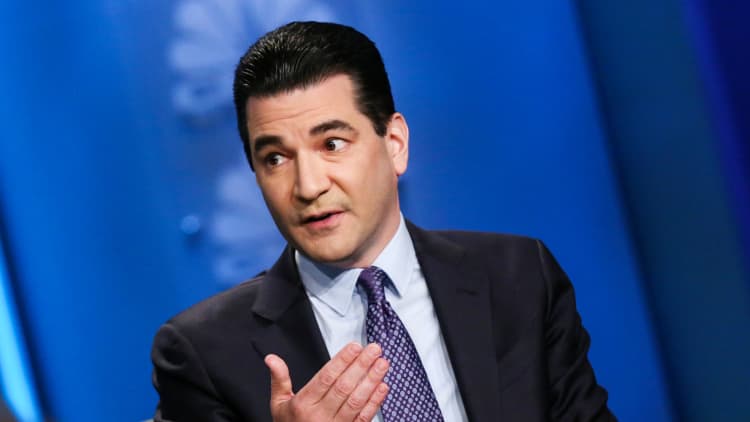
Former FDA Commissioner Scott Gottlieb on Wednesday said that cases of the new coronavirus will continue to spread rapidly, and the U.S. needs to prepare its response.
"I think it's going to get worse globally," Gottlieb — a physician, health advocate and Pfizer board member — told CNBC's "Squawk Box."
"That does not mean that it's going to become an epidemic in the United States, we can still prevent that," he added.
China's National Health Commission said that as of Tuesday night, a total of 24,324 cases have been confirmed and at least 490 people have died in the country. There's also been one fatality in the Philippines.
The World Health Organization said there's been more than 150 coronavirus cases in about two dozen countries outside of China and declared the virus a global health emergency.
The virus was first discovered in December in the Chinese city of Wuhan in Hubei province. It has since spread to other countries, including the U.S., which has reported 11 cases.
Gottlieb said that he doesn't expect the U.S. to see an epidemic level of coronavirus cases, though he does anticipate the deadly virus to further spread across the nation.
"We will see more cases in the U.S. and a lot will be undetected," the CNBC contributor said. "It's likely that there are cases here in the U.S. where people are spreading it at a low level, and we're not testing."
About a quarter of coronavirus patients exhibit severe symptoms, health officials have said. The rest show mild, flu-like symptoms, while many people could go undetected. Many health experts and analysts, including Gottlieb, believe the number of global coronavirus cases to be much higher.
The flu and coronavirus have similar symptoms, which some health officials fear will cause misdiagnoses. Common flu symptoms include fever, cough, sore throat and aches. Coronavirus symptoms include fever, cough and shortness of breath, according to the CDC.
"For every one person that we had, we might be missing eight or nine mild symptoms," Gottlieb said.
U.S. stocks were higher Wednesday after a report that scientists found a "breakthrough" when creating a coronavirus vaccine. However, WHO later played down media reports, saying there are "no known" treatments against the virus at this time.
A vaccine, if successful, isn't likely to help protect the general public anytime soon, Gottlieb said. If the coronavirus were to slow down in the summer, much like the common flu and come back in the fall for a "second wave," it could help, he added.
The deadly virus, which has mushroomed across China in the past few weeks, has caused several companies and organizations to close until further notice. Several airlines have canceled its flights to mainland China and Hong Kong, leaving some locked in or out.
James McGregor, chairman of APCO Worldwide's greater China region, told "Squawk Box" that he expects to see further delays. APCO is a global public affairs and strategic communications consultancy.
McGregor, who is usually based out of Shanghai, said expats like himself had traveled outside of China for the Lunar New Year holiday and are now stuck.
"I'm staying [in the U.S.] and I don't know when I'll go back. That's the case with a lot of business people," he said.
McGregor said that most people in China are hunkered down and avoiding public areas. He expects many businesses there to stay closed for a couple of months. Some companies in China were hoping to open back up next week.
"People are scared," McGregor said.


